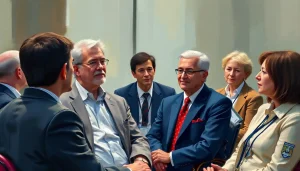Legal professionals who stay ahead of the curve know that missing the right conference can mean walking away from game-changing opportunities worth millions to their clients. In the ever-evolving world of estate planning, staying informed and connected is not just a professional necessity—it’s a competitive advantage. Estate planning conferences serve as crucial hubs of knowledge, innovation, and networking for legal professionals and wealth managers alike.
These gatherings are more than just a series of lectures and PowerPoint presentations. They’re dynamic ecosystems where the brightest minds in the field converge to share insights, debate strategies, and forge relationships that can shape entire careers. From seasoned attorneys to up-and-coming wealth advisors, the target audience for these events spans the entire spectrum of estate planning professionals.
But why exactly are these conferences so vital? Picture this: You’re sitting in a room filled with the collective wisdom of hundreds of years of legal experience. The air is electric with the exchange of ideas, and you can almost feel your professional toolkit expanding with each passing minute. That’s the power of an Estate Planning Seminar—it’s not just about learning; it’s about transformation.
The Diverse Landscape of Estate Planning Conferences
Estate planning conferences come in all shapes and sizes, each offering unique benefits to attendees. Let’s break down the main types:
National Conferences: These are the heavy-hitters of the estate planning world. Think of them as the Super Bowl for legal professionals. They attract top-tier speakers, cover a wide range of topics, and offer unparalleled networking opportunities. The downside? They can be pricey and may require significant travel.
Regional Conferences: Don’t underestimate the power of these more localized events. They often focus on state-specific laws and regulations, making them invaluable for practitioners working in particular jurisdictions. Plus, they’re usually more budget-friendly and easier to attend.
Virtual Conferences: The digital revolution has transformed the conference landscape. Virtual events offer flexibility and accessibility, allowing you to soak up knowledge from the comfort of your office or home. They’re particularly useful for busy professionals who can’t afford extended time away from their practice.
Industry-specific Conferences: These niche events cater to specialized areas within estate planning. Whether you’re focused on charitable giving, international clients, or digital assets, there’s likely a conference tailored to your specific interests.
Diving Deep: Key Topics at Estate Planning Conferences
The beauty of estate planning conferences lies in their ability to cover a vast array of crucial topics. Let’s explore some of the key areas you can expect to delve into:
Latest Legal Updates and Regulations: The legal landscape is constantly shifting, and staying current is non-negotiable. Conferences often feature sessions dedicated to recent court decisions, legislative changes, and regulatory updates that can significantly impact your practice.
Advanced Estate Planning Strategies: For those looking to level up their game, sessions on cutting-edge planning techniques are a goldmine. From dynasty trusts to intentionally defective grantor trusts, these discussions can open up new avenues for serving high-net-worth clients.
Tax Planning and Minimization Techniques: Let’s face it—taxes are a huge part of estate planning. Conferences often feature in-depth explorations of tax minimization strategies, helping you save your clients potentially millions in estate taxes.
Digital Asset Management in Estate Planning: In our increasingly digital world, managing online assets has become a critical component of estate planning. Conferences are at the forefront of addressing this evolving area, offering insights into handling everything from cryptocurrency to social media accounts.
Ethical Considerations in Estate Planning: Navigating the ethical minefield of estate planning is crucial for maintaining professional integrity and client trust. Conference sessions often tackle thorny ethical issues, providing guidance on best practices and potential pitfalls.
Networking: The Hidden Gem of Estate Planning Conferences
While the educational aspect of conferences is undoubtedly valuable, the networking opportunities can be equally game-changing. Here’s why:
Building Professional Relationships: Conferences provide a unique environment for forging connections with peers, mentors, and potential collaborators. These relationships can lead to referrals, partnerships, and invaluable professional support down the line.
Connecting with Industry Experts: Where else can you rub shoulders with the authors of the textbooks you studied in law school? Conferences give you direct access to thought leaders and industry giants, offering chances for one-on-one conversations that can shape your career trajectory.
Collaborating with Peers: The person sitting next to you in a session could be your next co-counsel on a complex case. Conferences foster an environment of collaboration, allowing you to expand your professional network and potentially your practice’s reach.
Finding Potential Clients or Partners: Many attendees at estate planning conferences are not just fellow attorneys but also wealth managers, financial advisors, and other professionals who could become valuable referral sources or even clients themselves.
Preparing for Success: Making the Most of Your Conference Experience
Attending an estate planning workshop or conference isn’t just about showing up—it’s about showing up prepared. Here’s how to ensure you squeeze every ounce of value from the experience:
Researching Conference Agendas and Speakers: Don’t wait until you arrive to decide which sessions to attend. Study the agenda in advance, research the speakers, and plan your schedule to maximize your learning opportunities.
Setting Personal Learning Objectives: What do you want to achieve by attending this conference? Whether it’s learning about a specific area of law, meeting potential mentors, or finding new clients, having clear objectives will help guide your conference experience.
Preparing Questions for Speakers and Panelists: Come armed with thoughtful questions. This not only enhances your learning but also helps you stand out and make meaningful connections with speakers and fellow attendees.
Bringing Necessary Materials and Technology: From business cards to laptops or tablets for note-taking, ensure you have all the tools you need to engage fully and capture important information.
Maximizing Value: Turning Conference Insights into Practical Gains
Attending the conference is just the beginning. The real value comes from what you do with the knowledge and connections you’ve gained. Here’s how to maximize your return on investment:
Attending Relevant Sessions and Workshops: While it’s tempting to try and attend everything, focus on the sessions most relevant to your practice and goals. Quality over quantity is key.
Engaging in Discussions and Q&A Sessions: Don’t be a passive observer. Engage in discussions, ask questions, and share your own experiences. This active participation enhances your learning and helps you make meaningful connections.
Taking Effective Notes and Summarizing Key Takeaways: Develop a system for capturing and organizing the wealth of information you’ll be exposed to. Consider creating a post-conference summary for yourself and your team to ensure key insights don’t get lost in the shuffle.
Following Up with New Contacts Post-Conference: Don’t let those business cards gather dust. Reach out to new contacts within a week of the conference, referencing specific conversations to keep the connection warm.
Implementing Learned Strategies in Practice: The true test of a conference’s value is how it impacts your practice. Set aside time to review your notes and develop an action plan for implementing new strategies or technologies in your work.
Estate planning conferences are more than just educational events—they’re catalysts for professional growth and practice development. By immersing yourself in the latest industry knowledge, connecting with peers and experts, and actively applying what you’ve learned, you position yourself at the forefront of the estate planning field.
The landscape of estate planning is constantly evolving, influenced by changes in law, technology, and societal norms. Staying current through estate planning courses and conferences isn’t just about maintaining your professional edge—it’s about providing the best possible service to your clients. Each conference you attend, each connection you make, and each new strategy you learn has the potential to significantly impact your clients’ financial futures.
As you look ahead to your next professional development opportunity, remember that the right conference could be the key to unlocking new levels of success in your estate planning practice. Whether you’re drawn to the comprehensive coverage of national events like the Heckerling Institute on Estate Planning, the convenience of estate planning webinars, or the focused learning of a local estate planning workshop, each experience offers unique value.
In the end, your commitment to ongoing education and networking through estate planning conferences doesn’t just benefit you—it elevates the entire profession. By staying informed, connected, and at the cutting edge of estate planning practices, you’re not just securing your own professional future; you’re helping to shape the future of estate planning itself.
So, as you consider your professional development plans, ask yourself: Can you afford to miss out on the next game-changing opportunity? The answer, for those committed to excellence in estate planning, is a resounding no. Your next conference could be the key to unlocking unprecedented success for both you and your clients. Don’t let that opportunity pass you by.
References:
1. American Bar Association. (2021). Estate Planning Conferences: A Comprehensive Guide for Legal Professionals.
2. National Association of Estate Planners & Councils. (2022). The Impact of Continuing Education on Estate Planning Practices.
3. Journal of Financial Planning. (2023). Networking at Professional Conferences: Strategies for Success.
4. Heckerling Institute on Estate Planning. (2023). Conference Proceedings and Highlights. University of Miami School of Law.
5. American College of Trust and Estate Counsel. (2022). Best Practices for Maximizing Professional Development at Estate Planning Conferences.
6. Estate Planning Journal. (2023). The Evolution of Virtual Conferences in Estate Planning Education.
7. Wealth Management.com. (2022). The Role of Technology in Modern Estate Planning Practices. https://www.wealthmanagement.com/estate-planning/role-technology-modern-estate-planning-practices
8. Financial Planning Association. (2023). Ethical Considerations in Estate Planning: Conference Insights and Case Studies.
9. Internal Revenue Service. (2023). Estate and Gift Taxes. https://www.irs.gov/businesses/small-businesses-self-employed/estate-and-gift-taxes
10. Digital Estate Planning Association. (2023). Managing Digital Assets in Estate Planning: Current Trends and Future Projections.












Would you like to add any comments? (optional)